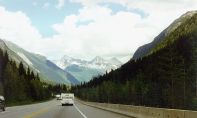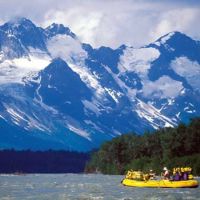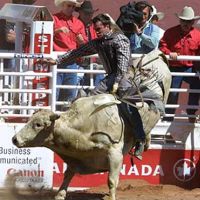- About Us
- Columns
- Letters
- Cartoons
- The Udder Limits
- Archives
- Ezy Reading Archive
- 2024 Cud Archives
- 2023 Cud Archives
- 2022 Cud Archives
- 2021 Cud Archives
- 2020 Cud Archives
- 2015-2019
- 2010-2014
- 2004-2009
 |
The Cud Postcard: Stampeding From Coast To Coast, Via Alaska |
That great source of popular traveling information — the (un)Lonely Planet, suggests that the road trip across Canada is the longest  continuous paved route in the world. At various stages in the past 4 weeks and 12,000km across the world's second largest country, I wondered if this was a travelers' urban myth, as the Trans Canada and Alaska Highways appeared to be the longest 'semi-paved road in the world' under constant repair from winter permafrost damage.
continuous paved route in the world. At various stages in the past 4 weeks and 12,000km across the world's second largest country, I wondered if this was a travelers' urban myth, as the Trans Canada and Alaska Highways appeared to be the longest 'semi-paved road in the world' under constant repair from winter permafrost damage.
While the road conditions were unexpected, the drive east to Montreal became significantly longer due to my deliberate, though unconventional route east... via Alaska. The Trans Canada crosses the continent near the 49th parallel for much of its course, which perhaps isn't the shortest arc across the earth's surface. A 'great circle distance' curving slightly north towards the North Pole may in fact be the shortest route between Vancouver and Montreal, however I proved beyond doubt that it is not via Alaska and the Yukon.
Initially from Vancouver the road east through the Rockies arrives in Calgary, which during July hosts the world's biggest rodeo, the Calgary Stampede — or Stup-ede in some quarters. The city seems to go out for a long lunch for ten days, often beginning at breakfast in a sight vaguely comparable to Brisbane's Ekka — but  on steroids. I'm not sure that I remember 'cowgirls' at the Ekka wearing t-shirts which read: "I walk with my legs wide apart because _ _ _ _ _ _ _ _" (which for the sake of decency and your imagination is better left censored).
on steroids. I'm not sure that I remember 'cowgirls' at the Ekka wearing t-shirts which read: "I walk with my legs wide apart because _ _ _ _ _ _ _ _" (which for the sake of decency and your imagination is better left censored).
For the generally polite inhabitants of Canada those Stampede t-shirts must be quite a shock, though they weren't the only surprises along the way. Canadians proved to not be completely earnest — the 'Top of the World Highway' between Alaska and the Yukon isn't in fact on the top of the world, for example. Likewise, the prairies of Saskatchewan and Manitoba are flat, but despite what Canadians say, you can't actually see your dog running away for three weeks. Even greater surprises were: a warm welcome at the US border, and then staying in an Alaskan campground where you won a free breakfast if you managed to toss a pancake into a bucket (which, for those of you who have been trying to guess, is close to completing the censored Stampede t-shirt slogan...).
Away from Calgary's current oil fuelled economic boom, Canada has a long history of resource explosions, notably including another group of Stampeders — the gold prospectors of the late 1890's who poured north into Alaska and the Yukon seeking their fortunes through Skagway, Whitehorse and Dawson City. Likewise I headed northwest from Calgary, up the Canadian Rockies following the old Stampeders route to within a few hundred kilometres of the Arctic Circle and who knows how many secret Russian submarines. As Jack London wrote: "I came to the Yukon seeking gold, instead I found myself."
seeking their fortunes through Skagway, Whitehorse and Dawson City. Likewise I headed northwest from Calgary, up the Canadian Rockies following the old Stampeders route to within a few hundred kilometres of the Arctic Circle and who knows how many secret Russian submarines. As Jack London wrote: "I came to the Yukon seeking gold, instead I found myself."
Being a big country isn't limited to road distances, and just as Calgary has the world's largest rodeo, just about every town lays claim to something oversized. Apparently the town of Andrew in Manitoba has the world's largest mallard duck, though a learned international source (who'd probably rather remain anonymous) once informed me that mallards have been known to display homosexual necrophilia — perhaps the townsfolk of Andrew hadn't received the report before they built their iconic monument. With countless other statistics of distance, size, and other ducks, perhaps Canada is the cricketing equivalent of the sporting world — numbers and trivia.
And finally, as distinct from the massive "Winnebagoes" that careered around every corner, driven by North American grey nomads, Canada enchanted me with the story of "Winnie the Bear Goes." Just as I crossed the country in a few weeks, Lt. Colbourne, an army veterinarian from Winnipeg had taken the train to Quebec for army  training in 1914. Along the way he'd acquired an orphaned black bear cub in the small rail town of White River, Ontario, smuggled her aboard, through army training camps, across the Atlantic to camps in England and then finally loaned her to the London Zoo when he was posted to the Western Front. Lt Colbourne survived the war, as did his bear "Winnie" (named after his home town) who'd captivated wartime London, including one Christopher Robin Milne, A.A. Milne's son. From there, the Canadian bear became a very English bear in the literary world, and now a very Disney bear elsewhere — including his hometown of White River where I stopped to break up my modern day motoring stampede — 'Smarter than your average bear.'
training in 1914. Along the way he'd acquired an orphaned black bear cub in the small rail town of White River, Ontario, smuggled her aboard, through army training camps, across the Atlantic to camps in England and then finally loaned her to the London Zoo when he was posted to the Western Front. Lt Colbourne survived the war, as did his bear "Winnie" (named after his home town) who'd captivated wartime London, including one Christopher Robin Milne, A.A. Milne's son. From there, the Canadian bear became a very English bear in the literary world, and now a very Disney bear elsewhere — including his hometown of White River where I stopped to break up my modern day motoring stampede — 'Smarter than your average bear.'
